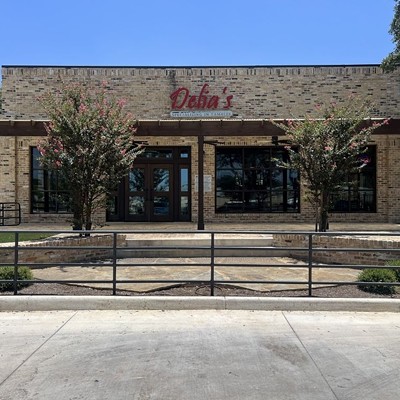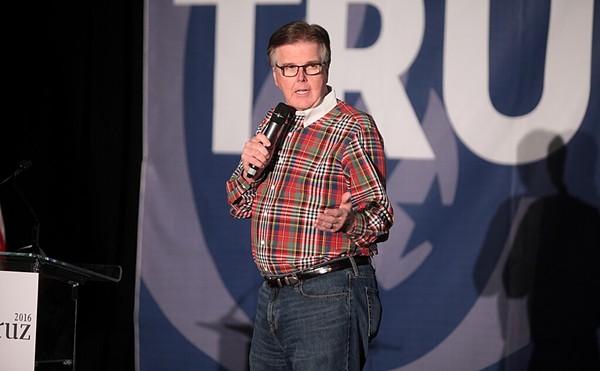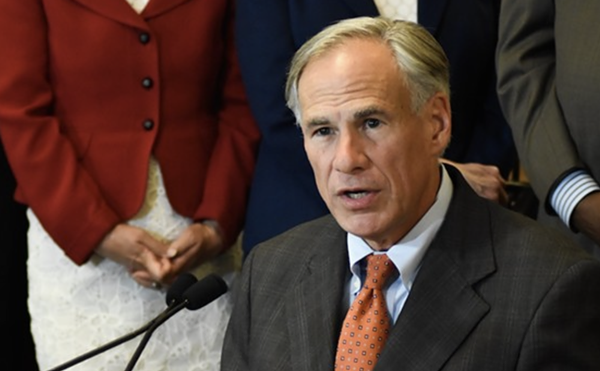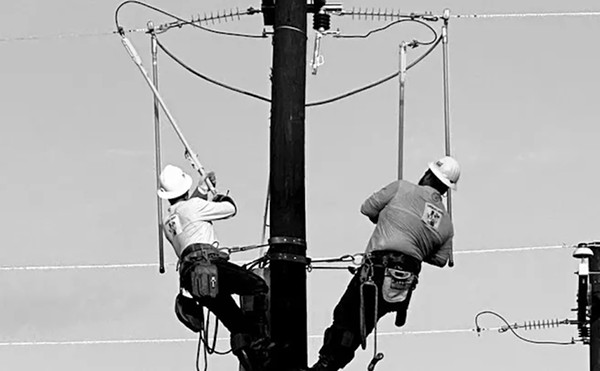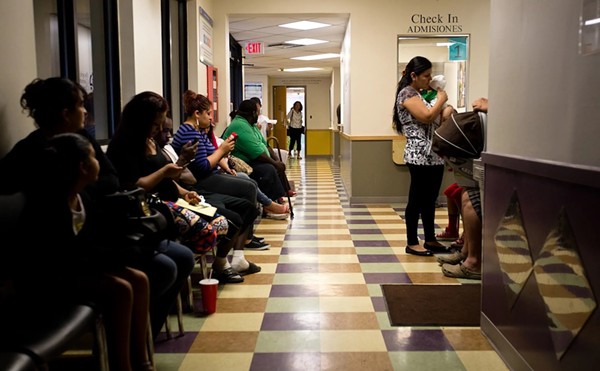With a new CD on the way, Mojoe carries the weight of San Antonio hip-hop on its back
The members of Mojoe like to refer to their band as a family. The San Antonio R&B/hip-hop collective, fronted by emcees Tre (T.R.E.) Scipio and Charles (Easy Lee) Peters, speaks with an almost evangelical zeal about expanding the frontiers of contemporary music and carrying the entire creative family along for the ride.
| Tre Scipio, left, and Charles Peters in vintage bluesman mode. |
It's an easy claim to make, but when you see the band crowd the stage at the Austin blues mecca, Antone's, for a Friday night gig, the familial vibe is unmistakable. The stage is so crowded with group members, you wonder if Scipio and Peters allowed every distant cousin and high-school acquaintance a role in Mojoe. There's Katt Daddy, the smooth-talking master of ceremonies, whose introduction of the band recalls the old-school soul revues of James Brown and Ray Charles. There are two keyboard players, who go by Cooley High and Mr. Keys. There's Uncle Jimmy on bass (literally Scipio's uncle), Funky Genius on drums, and two soulful backup singers who answer to Chitlins and Greens. D-Madness, a blind jazz guitarist, is temporarily filling in with Mojoe, but his easy camaraderie with the rest of the group and ear-to-ear grin suggest that he's already been adopted as part of the family.
"It's the way we live," Peters, 25, says of the close connection between the group's members. "We associate and surround ourselves with people who live by the motto, 'When you shine, I'll grind.' That's our family. You've got to be on the grind, you've got to be willing to sacrifice, because there's not a lot of money and popularity in what we do, but it's a legacy in what we do."
On the eve of its sophomore CD release, Mojoe carries more than the weight of its own ambitions. In a sense, it also carries the possibilities for San Antonio hip-hop with a dynamic live-band approach that makes impassioned believers of almost everyone who catches the group in the act. Among others, it also carries the hopes of Focus A&R, its Houston-based management company, and Cesario Garcia, a local documentary filmmaker who has become such a passionate believer in the group that he's agreed to work for their management team.
But if Mojoe is a family, it has certainly battled its share of dysfunction. In 2004, Scipio and Peters replaced their entire backing band, due to what they describe as conflicting priorities with their original lineup. They also endured a frustrating stretch when industry buzz in Hollywood promised big things, but ultimately delivered nothing.
"Their original management's vision was focused on going to Hollywood and making it there, instead of building an establishment here in Texas," says Garcia, 34, a budding filmmaker who has chronicled the group's growing pains. "At one point, they seemed to stall out, not the band, but the people who didn't know how to perpetuate their career."
| Cesario Garcia, above, is a documentary filmmaker who has become part of Mojoe's extended family. (Photo by Gilbert Garcia) |
The central irony of Mojoe's career is that what sets the group apart and excites most fans - they bring a live band to hip-hop - is also what makes them a hard sell to radio and industry shakers. For that reason, Scipio and Peters agreed to compromise their vision for Dirty Genes, the forthcoming followup to the band's stellar 2003 debut Classic Ghetto Soul. While they used their band on some tracks, they also allowed outside producers to supply them with beats that might make them seem less eccentric to contemporary radio programmers. Considering that Mingo Fishtrap's Roger Blevins Jr. provided all the music for Classic Ghetto Soul, at a time when Scipio and Peters were still piecing together a band lineup, there remains a disconnect between what Mojoe puts across onstage, and what it produces in the studio.
"`Dirty Genes` was different because we reached out more to different producers with different flavor," says Scipio, 26, a raspy voiced native of the East Side. "We wanted to make sure we brought the soulful, but also went and got beats from people who worked with Nappy Roots, Tupac `Shakur`, and Devin the Dude. These are people who have been in the industry and know what's needed on the radio and needed for the videos. We put our souls to that and we'll come back and hit 'em with the instrumentals next time."
In one sense, Mojoe couldn't have found a more fortuitous time to make its charge. After long periods of dominance by the East and West coasts, hip-hop now finds itself turning to the Deep South. Between the raw crunk juice squeezed out by Lil' Jon and the East Side Boyz, the Memphis grit of Three 6 Mafia, the rural Kentucky mud of Nappy Roots, the self-mythology of Houston's Mike Jones, and the crossover experimentalism of Outkast, it's become positively chic to hail from below the Mason-Dixon line.
| "The connection between New Orleans and San Antonio plays an important role in what they're doing. The name of the documentary, as of now, is The Sabine Boys, because the Sabine River connects Louisiana and Texas." - Cesario Garcia |
While Mojoe shares little with those groups (aside from Outkast's adventurous streak), they do have geography on their side. Peters is a New Orleans native who moved to San Antonio as a teenager and quickly forged a close friendship with Scipio, his classmate at Clark High School. Years before Hurricane Katrina compelled the two cities to bond, Peters and Scipio did it on an individual level.
"The connection between New Orleans and San Antonio plays an important role in what they're doing," says Garcia. "The name of the documentary, as of now, is The Sabine Boys, because the Sabine River connects Louisiana and Texas. One of their songs even has the line: 'Meet me at the Sabine River.'"
Garcia's unfinished Mojoe documentary, made with his production partner Lorenzo Lopez, includes footage of Peters visiting his old New Orleans haunts only six months before Katrina would wash them away.
"For the first few days it was hard because I couldn't reach anybody because of the phones, so I didn't know if they were dead or alive," Peters says of family members affected by Katrina. "My immediate family's accounted for. A lot of them lost things. But I've got about eight family members who've come to San Antonio and are going to relocate here."
The members of Mojoe estimate that they've sold about 2,000 copies of Classic Ghetto Soul, a respectable figure considering that they released it without a distribution deal or financial backing, primarily selling CDs at gigs and out of the trunk of their car.
With a committed management team behind them and a devout live following, the group hopes to sell at least 30,000 copies of Dirty Genes in Texas. To spread the word in advance of the album's late fall release, they joined fellow Lone Star mavericks Bavu Blakes, Money Waters, Verbal Seed, and DJ Donnie D for a short series of shows billed as "The Livest Texas Hip-hop Tour Ever."
"The spotlight is on the South and we have to do right with the opportunity," says Peters, a veteran of SA's poetry-slam circuit. "We call this a 'soulful, hip-hop Texas live music movement.' Together, we've got Texas and the whole South on our shoulders to bring the soul out. We're probably as high as the underground can take us, as far as feeling successful making good music. But together we can take it to the world."
The first time Cesario Garcia saw Mojoe onstage, he felt his adolescence tugging on his shoulder. Garcia grew up overseas as an Air Force brat, and became hooked on breakdancing when he saw Beat Street and Breakin' in Spain. He says Mojoe made him recall the enthusiasm he felt for hip-hop during its early days, an enthusiasm which had diminished during the gangsta-rap era.
"When I saw them perform, seeing them work with a full band as they rapped was different, because I'd thought of rap as a guy with a mic and a guy scratching on his turntables. It made me think outside the box and I knew this was going to be a fun project."
Garcia had gone to see Mojoe because Scipio approached him in 2003 about making a documentary on the group. Garcia quickly went to work with his friend Lorenzo Lopez, a fellow Air Force brat, who'd bought a camera for the purpose of making short films.
Garcia settled in San Antonio in 1996, and was working at a local Blockbuster Video when one of his co-workers told him he had a good radio voice and should consider San Antonio College's Radio, Television and Film Department. Garcia complied and began getting commercial work in 1998. Two years later, he worked for three weeks on the Sandra Bullock comedy Miss Congeniality, as an extras-casting assistant. "I learned everything you could think of on that movie," he says. "I was a sponge. I saw what to do and not to do, how to treat people and how not to treat people."
Garcia and Lopez both work in TV news, with Garcia a cameraman for KENS-5 and Lopez doing similar work in Las Vegas. But for both of them, Mojoe has supplanted all other considerations. Garcia, a hyperactive fast talker, speaks enthusiastically about directing videos for tracks from Dirty Genes. He has also become an official part of the Mojoe family, being drafted by the group's management to seek investors who can provide funds for music videos and other group projects. While some might regard this as a thankless task, he sees the process as training for his future work as a film producer. He has also observed the chemistry between Scipio and Peters from a uniquely close vantage point.
"They're like two brothers and they fight sometimes like brothers," he says. "I don't mean fisticuff fighting, but they have creative quirks about themselves. In the doc we captured some of that, where they'll go back and forth and then finally say, 'Oh, I understand what you mean.'"
It's nearly midnight when Mojoe takes the stage at Antone's on Friday, September 16. The preceding act, Verbal Seed, delivered a well-received set, but it followed the well-worn formula of rapping over pre-recorded beats. As Mojoe's backing band settles into a seductive jazz groove, the energy of a live ensemble noticeably elevates the energy level in the club. Among the approximately 200 people in attendance, about 50 of them are San Antonians who made the drive to Austin.
Scipio wears a white wife-beater underneath an unbuttoned striped shirt, with knee-length khaki shorts and white sneakers. A mammoth crucifix hangs from his neck. Peters wears a coffee-colored shirt book-ended by matching camouflage cap and shorts. As always, they command the stage with a mixture of idealistic fervor ("I wanna be remembered as a music hero") and party randiness (the V-double-O, D-double-O" chant of "Voodoo Coochie"), and demonstrate that they're convincing soul singers as well as tight rappers.
| "The spotlight is on the South and we have to do right with the opportunity. We call this a 'soulful, hip-hop Texas live music movement.'" - Charles Peters |
"Everywhere we go, people ask, 'What the fuck do you do? What genre do you play?'" Peters conspiratorially shouts to the crowd. "'Is it blues, is it jazz, is it country, is it pop, is it hip-hop, is it mainstream, is it underground?'" The band kicks into a midtempo funk rhythm, and this series of questions establishes itself as the song's central hook. You sense that Scipio and Peters don't mind the questions, because they indicate that the group cannot be pigeonholed.
After the show, Peters and Scipio discuss their determination to open up new possibilities in R&B and hip-hop for music, lyrics, and live presentation.
"We were walking from a record store in Austin yesterday and I stopped for a minute and looked and saw 10 guys walking to our van," Peters says. "And I thought, 'They don't do it like this no more.' People don't go with a band and just go from city to city and play from their soul no more. That just put everything in a nutshell for why we do what we do. Everybody was walking in one direction: musicians, songwriters. That's what I'm talking about." •





